Timişoara, 1989: the days of the revolutionAreas Romaniaita engTimişoara, 20 years later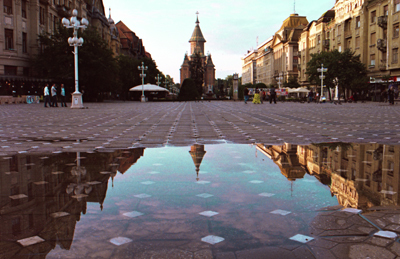 Timişoara today - F.Martino Ioan Savu used to work in a detergent factory in Timişoara. On the 16th of December of 1989 he took the streets with thousands of fellow citizens. Four days later he was in front of a disbelieving Romanian Prime Minister to demand free elections and Ceauşescu's resignation. A life and a revolution. 03/11/2009 - Francesco Martino, Davide Sighele TimişoaraIoan Savu is one of the "accidental heroes" of the Romanian revolution of 1989. During the Communist regime, Savu worked in a detergent factory in Timişoara. During the bloody city revolt that triggered the fall of Ceauşescu, he played, almost accidentally, a leading role. After joining the popular delegation that represented the crowd, he himself wrote the list of requests that the revolutionaries of Timişoara gave Constantin Dăscălescu, then Prime Minister, whom Ceauşescu had sent to the city to negotiate with the insurgents. Twenty years after those dramatic events we met with him in the city where he was the protagonist of those events and where he still lives. His memories, emotions and reflections on those days that changed his life and the life of all Romanians. The voice on a revolution that, according to Savu, "is not over yet and is still working inside of us". The revolution in Timişoara The fall of Nicolae Ceauşescu's regime started in Timişoara, a city of Western Romania. On the 15th of December of 1989 Romanian authorities wanted to expel the reformed pastor Lazlo Tőkés, disliked by the regime because of his sermons, in which he did not omit condemnations of the regime. Having been told of the authorities' intentions, a group of faithful gathered in front of the house where he lived, in an area very near to the centre of the city. Authorities were not able to disperse the protesters and by the following day, the 16th, hundreds of people had gathered in front of the pastor's house, people belonging not only to the Hungarian community, of which Tőkés was part. In the afternoon of the same day, the slogans pro freedom of religious expression soon turned into slogans against the regime and protests spread to different areas of the city. The army, the police and the secret police (Securitate) intervened to disperse the protesters. Hundreds of people were beaten and arrested. In the afternoon of the 17th of December, though, the citizens of Timişoara took the streets again. The police opened fire and tens of people died. On the 18th protesters gathered again, there were new riots and other victims. On the 19th factory workers from the city went on strike and on the 20th they marched towards the centre of the city, where the Romanian Prime Minister Constantin Dăscălescu met with a delegation of the insurgents. They presented him with a list of requests that were not accepted. But the army, that day, retired in the barracks and the insurgents declared Timişoara a free city. 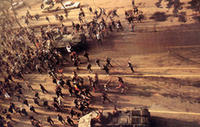 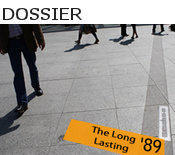 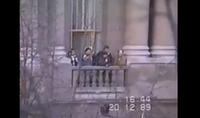 Ioan Savu addresses the crowd on December 20th, 1989 Watch the video on Youtube Dawn For me the revolution started at the end of 1987, after the Braşov rebellion of the 15th of November when tens of thousands of workers rebelled against the regime's restrictive economic policy, with street protests that led to hundreds of arrests. From then on, I have always thought that something would happen, and I was ready. There was a feeling in Timişoara, before the revolution, that convinced me we could be destroyed, wiped out, but not defeated. Everything happened calmly, people did not let emotions overwhelm them, at all! People were calm and extremely determined. 16 December A neighbour called me: "come, they have started... there are ten, a hundred, a thousand, a million men... Come!" and I got out of the house. They were difficult moments for me, until late at night. 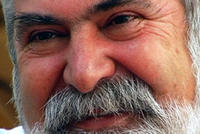 Ioan Savu We went through the city in perfect order. We did not even step on the grass in the flowerbeds. In Opera Square there are large flowerbeds, that December there was no snow in Timişoara, it was warm and in the images from above you can see how people gathered round the flowerbeds but did not step on them. We were a real wall. For this conviction, in Timişoara we were able to take power for a week, a week in which the city was alone. We were hoping the rest of the country would follow us but we could not be sure. Regardless of what would happen, though, I am sure we would have gone ahead. There was an phrase, in those days: communism was born on the Neva and died on the Bega the river that washes Timişoara. There were various groups in different areas of the city. It was not a crowd of thousands of people, the groups were made of ten to a hundred people. After the riots in Maria Square they headed towards all the areas of Timişoara. There were riots also at the County Council. That day I did not suffer directly, I was not injured. Yes, I did feel strong emotions during the night, but it is of little importance. The day after, the 17th, it all started again and the protest became even more vigorous. 17, 18 December On the 17th my children had gone out food shopping. Since they were not coming back, my wife went out like a lioness to bring them home. That day, on the corner of our street - it was a Sunday morning - a military car would not let us pass. I shoved the two officers off and I saw my children coming back holding hands. In those days, people in Timişoara felt the need of cohesion. We wanted to be together, all people were together. In our city there are very few ethnic conflicts or tensions, and of little importance. It does not matter if my friend's name is Miodrag or Ianos ... what matters is that they are my neighbours, my friends, men. On the 17th there were youngsters who wanted to head towards the centre. At that point there where shootings already in the whole city. We had Beirut to compare ourselves to, on TV we watched what was happening in Beirut ... but in Timişoara there was more turmoil than in Beirut. Bullets were flying in every which way. I told those youngsters to be careful, that people were dying everywhere in the city and that freedom could not be earned with a pin on your chest. People went to work, that day, and started discussing what was happening. It was difficult to get information. People from different neighbourhoods met in the factories, so we got a more complete picture. The mornings, those days, went by relatively calmly. Then we took the streets in the afternoons and at night. There were a lot of shootings on the 17th but also on the 18th. Down-town, I saw people hitting the bullet-proof cars with their fists, they had nothing to fight with against the armed forces of the regime. But there was so much determination, so much firmness in not backing down. At one point I saw my daughter holding hands with a boy, all around smoke bombs and tanks. "Why are they shooting at us, daddy, we're just children!". It was not normal to shoot at people, I hope they understood it and that sooner or later their mistake. There are still people today who believe that they did the right thing, that they acted for the good of their country. Maybe, but theirs was a sad country, a country has to be everybody's country, especially the new generations'. It was hard. The last shootings The last shootings were on the 19th. That day I spoke with my co-workers. I asked them to look after my wife and children if something happened to me. Then I asked myself: why am I so involved in all this? Actually, I was not more involved than others, but I felt the need to ask them to protect my family and to be free to express my convictions. Only with hindsight, though, do I realize that those were my thoughts. At that time I did not clearly know why I would say certain things, why I acted the way I did. On the 20th, all those who had discussed on the work place over the previous days and who had taken the streets in the afternoon and the evening found some cohesion. On the 20th, all workers came out of the industrial area of Buzias united. I think there were about 30 thousand people. The Prime Minister That day, something happened. Something I was not expecting and that I would have never imagined. We were outside the County Council. Inside there was the Prime Minister Constantin Dăscălescu, who had come from Bucharest to negotiate with the insurgents. When one or two people were asked to go in and talk to the Prime Minister, I thought they were not enough. When only a few people leave the crowd, it immediately loses trust in them, fearing they might be bribed or that they are too scared. So I told everybody that more people had to go in, 8, 13. If there is a group, the people in the group can support each other and they do not have to give up their plans. I also thought that one or two people could not summarize the thoughts of a whole city. I was in that group. When I went into the building, it was full of riot squads, berets, automatic weapons. They immediately told us that if someone tried to force the entrance, they would shoot us. After a week of shootings in Timişoara, I was sure they were not kidding. I then had to organize everything in some way, I left somebody inside and I went out again. There, a lawyer came up to me and asked me if he could come in too ... I knew, then, I was the leader of the group, unwillingly, accidentally. I thought also having a lawyer in our group would be good. We were not a homogenous group, we did not know each other, I did not know any of the people I went inside with. I did not know exactly what to do. It is difficult. I felt a strong pressure on my heart when I thought that I was responsible for those outside. If something had happened, and if those inside with the weapons had shot, I would have held myself responsible. And I kept thinking, God help me understand what to do. My name is Ioan Savu The Prime Minister was handed various requests. I was sharper than some others, many only made basic requests. I soon realized that we needed to keep communicating with all those who were outside the building. I went out on the room's balcony, where I saw there was a microphone. I knew that to trust us, people had to know, they had to meet us in person. So I took the microphone and said: "my name is Ioan Savu, I live on 16 Negoiului Street, apartment 18, I have 3 children and work in the Accountancy Department at the detergent factory". At that moment I was opening up, everyone knew, even the Securitate knew who I was. But those outside had to trust us, and we them. I went back inside and wrote on a diary what Timişoara wanted those days: we no longer wanted Communism, we no longer wanted Ceauşescu, we no longer wanted the government, we wanted TV and radio to broadcast what was happening in the city, we wanted to be able to print posters, we wanted all those arrested during the revolution to be freed, we wanted the bodies of our dead back and to bury them, and we had other requests. I caught everybody's attention, even the Prime Minister's, who came to me to discuss. I told him we did not want an eye for an eye, that we did not want to kill their families and their children, that too much blood had already been shed, but that together we had to find a solution to what was happening in Timişoara and in the country. Those moments were difficult and full of tension. For the Prime Minister, I was Mr. Nobody, a man raised in the streets, an insect of no importance, and he looked upon us with contempt. But we had no choice, we represented the crowd outside. I was sure I would not get out of there alive. Meanwhile I went out on the balcony again, I asked to surround the building and not let anyone escape. The Communist officials blocked in the building were a guarantee that in Timişoara there would be no more shooting. I also asked for a group of youngsters to be formed, with someone who spoke Serbian, to go to the Serbian consulate with a list of the protesters' requests and the names of the members of the negotiating committee. We knew the Serbian consulate was the only link Timişoara had with the rest of the country and the world.  Ioan Savu Notes At one point I was reading our requests to Dăscălescu and I realized he was listening, but he was not taking any notes. I asked him why, since he might forget everything. Immediately some Communist officials approached me, they probably wanted to choke me. Meanwhile the Prime Minister was appalled by my impertinence, but with a reflex gesture he searched for a pen in his pocket and immediately all the others came with a pen and a diary for him to write with. Talking about it now, it sounds comical, if it were not so dramatically tragic. Me reading and the Prime Minister writing the requests of us revolutionaries! It was an intense moment in my life. I wanted nothing for me, I showed later too that I did not use the revolution as an opportunity to fulfil myself socially or politically. I did not want that. I wanted things to go well for the country: if they went well for everyone, they went well for me too. I can look people straight in the eye, without being embarrassed, and that is very important. The capital After years of oppression, people wanted freedom, they wanted to run away from Ceauşescu, he represented evil. For them, Communism was Ceauşescu and by getting rid of him, we would get rid of Communism. But things are not that way. I too, and I thought about this many times, was glad when he was shot. But now I regret those feelings. They had to trial him, not kill him. After the days of Timişoara I went to Bucharest because I wanted to meet with other people and tell them what we from Timişoara wanted. I left on the 24th of December, by train. But I immediately realized that I was not important for those in the capital, they did not want to have any ties with others, I was not part of their interest group. They were difficult moments. God At one point I was under the impression that we had made it. Then I told myself: God exists! God has come back to us! I thought about it long. I wondered why God was coming back to us after such a long absence. And then I realized he had never left, but that it was us who were coming back to him. After those events, I tried more intensely to make Christian faith mine, to be a better man, to have more patience with others, to help them. That is how we can change the world, by changing ourselves. Timişoara, a state of the soul Our convictions brought benefits also on other levels, after those days. It is in Timişoara that the first free elections for a regional council and city-hall were held, in January of 1990, soon after the revolution. For the first time not only in Timişoara and the whole of Romania, but for the first time in the whole of Eastern Europe. It was here in Timişoara that we immediately organized ourselves to give people passports. Everything seems easy now, but at that time Romanians were not allowed to travel. And for us in Timişoara, because we were near the border, TV was like a window over the world: we watched Hungarian channels, Serbian channels, we knew what happened outside our walls. But it was not enough, we wanted to go there. After the revolution, here in the city we computerized the whole procedure of granting passports. We went from 100-150 issues a day to 2000. In this region, economic growth was spectacular also. And we could have done much more, had it not been for a muddled bureaucracy. We immediately set ourselves into action on concrete things, we showed people that we could change, that we had to change. And it was not easy. After the revolution, there was finally a horizon of prospects, in people, we wanted change, we needed change, we were ready for change. It is for this reason that Timişoara is a state of the soul, more than a city. Bananas and consumerism I remember a story. Even during Communism, I was not short of money. We tried to manage doing a little bit of everything, and I held a second job, taking pictures at weddings, baptisms, schools, generally in Timişoara or in the Banat. One of my sons once came back from school and told us that one of his schoolmates had received bananas from Germany. My son never asked anybody for anything. On that occasion, he told my wife "Mom, I want a piece of banana too, I asked my friend to let me taste it, but he said no". He was crying and shivering. And I thought of what kind of father I was, not even able to get a banana for my son. That is what was going on. I no longer want to live in a Socialist system where everything happens and no one is responsible for anything. People are not happy now either, of course. There are many products in the supermarkets, but often there is no money to buy them. There are many excesses, many people steal, there are lobbies that might as well be called mobsters. But it is different from then, anyway. We had no horizon, then. The revolution Once you take the streets, once many people get killed, nothing matters anymore, you can only move on, and that is what happened. Before there were victims you could negotiate, retreat. After that, not anymore. Revolution is a complex phenomenon. You need to change your mentality and if that is not yet the case, you need to go ahead, it means that the revolution still needs to work inside of us. In Romania the revolution is not over yet, even if it shows itself in a less dramatic and violent way, but only now are some ideas of change starting to be understood. And I think these changes have to take place in a non-violent way, with the force of ideas, without people dying in the streets. We then knew what we did not want, but not exactly what we wanted. It is difficult to know what you really want if you have no term of comparison. Then, the more you go up, the more the horizon widens. And that is what is happening for us too. |
